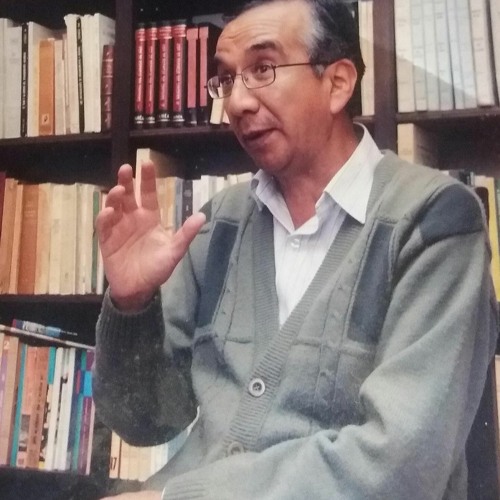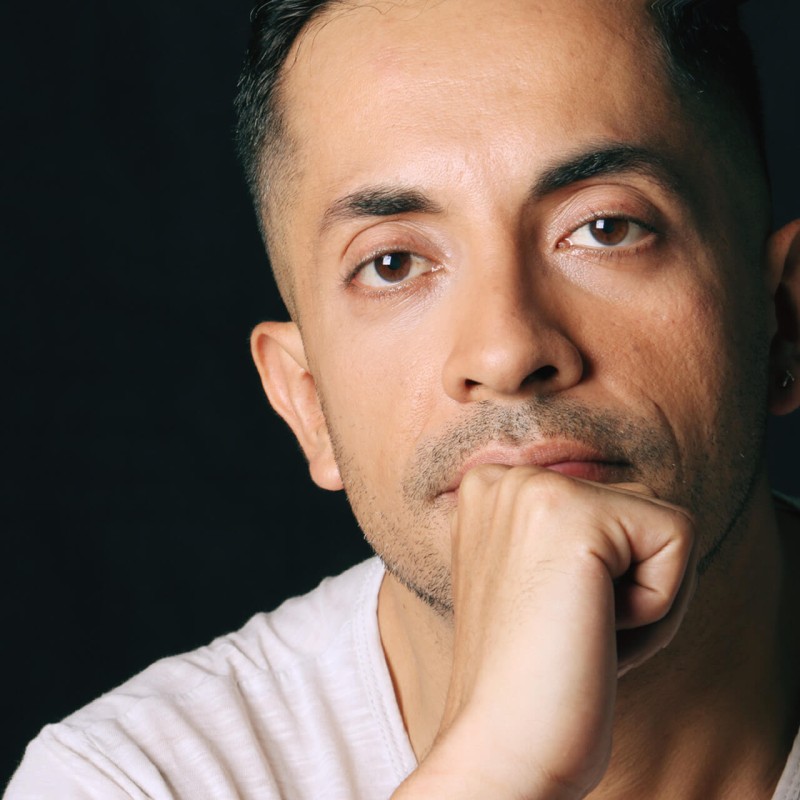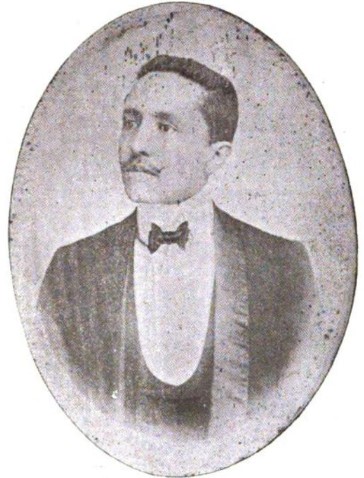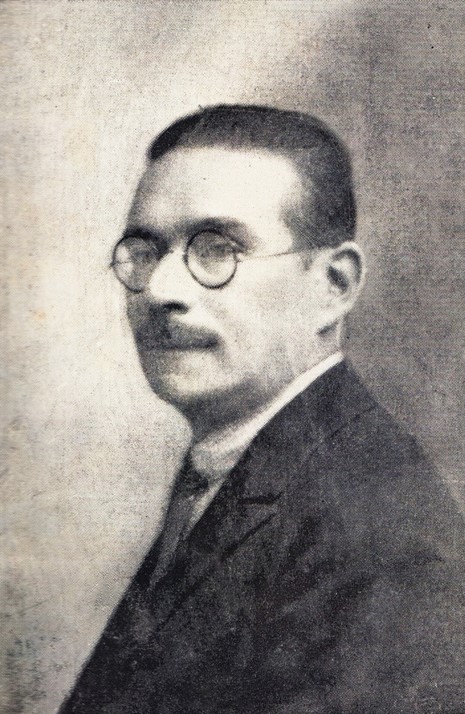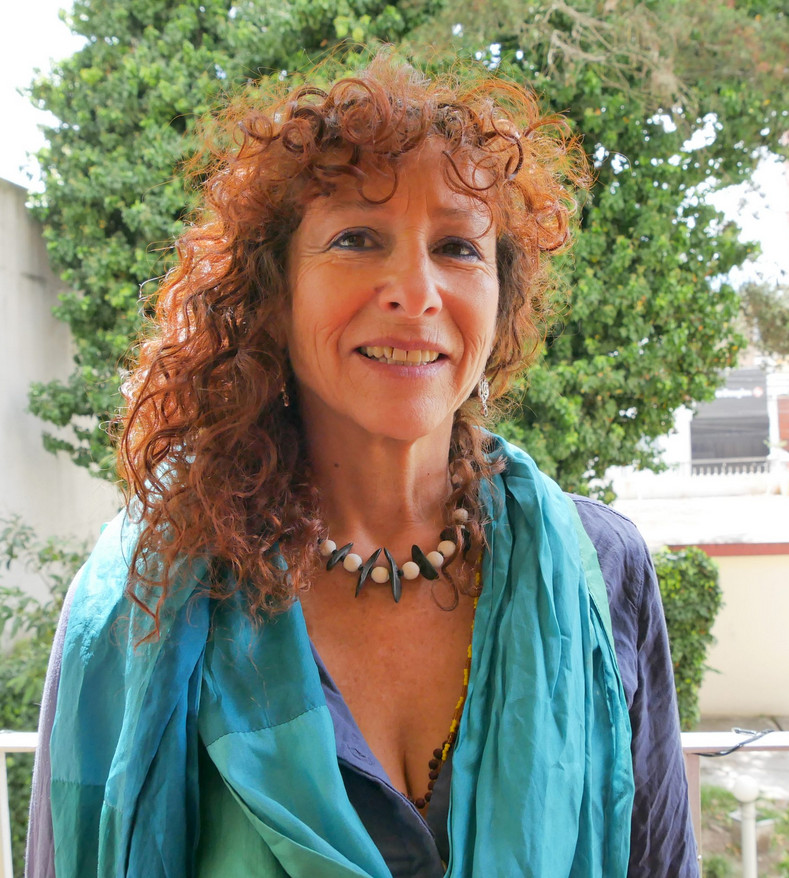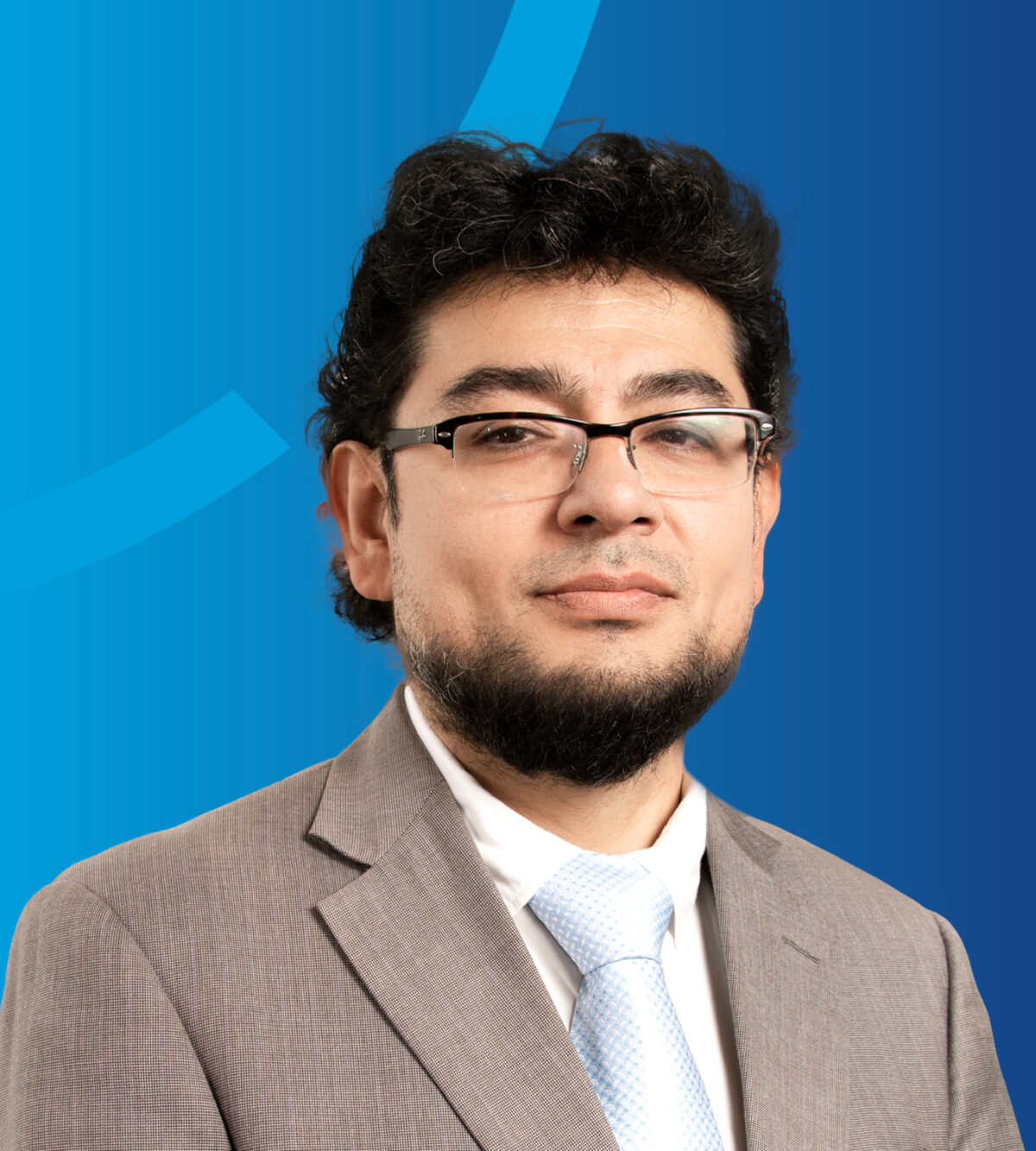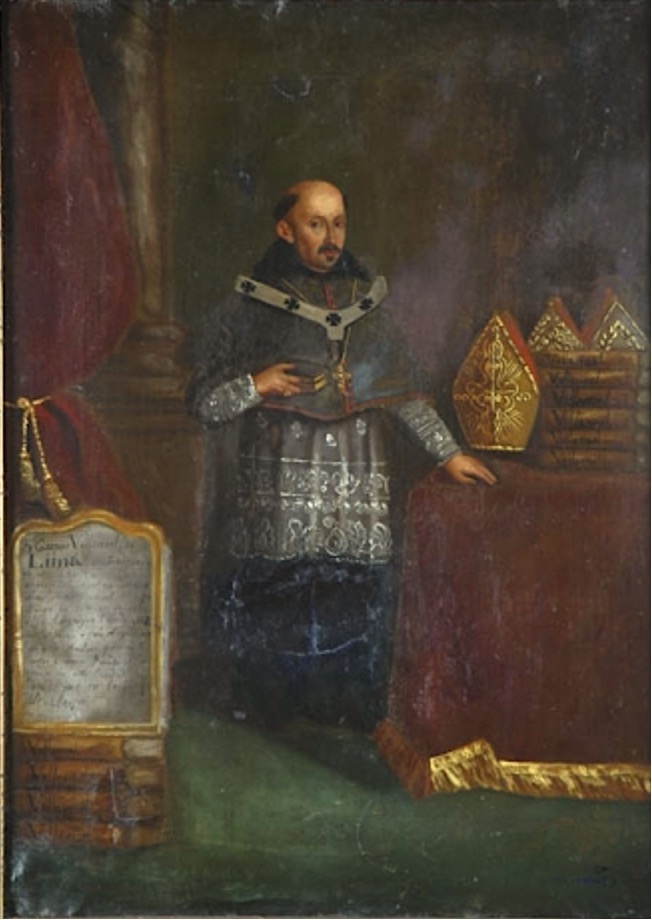Marcos Alcocer was a 17th-century Jesuit priest and poet from Quito, and brother to Hernando and Pedro Alcocer. He was admired for both the musical quality of his verses and his personal virtues. A professor of theology at the University of San Gregorio in Quito, Marcos authored two Latin theological treatises—De Divinis attributis (1658) and De Visone Dei (1665)—which are preserved in the national library and were written for the instruction of his students.
Continue reading “Marcos Alcocer”Category: Writers from Quito
Edgar Freire Rubio
Edgar Freire Rubio (Quito, June 3, 1947) is an Ecuadorian writer, historian, anthologist, and renowned bookseller. Born in the historic San Roque neighborhood, Freire dedicated over four decades to promoting Ecuadorian literature and preserving the cultural memory of Quito through his work as a bookseller and writer. His publications, including the multi-volume Quito: Tradiciones, Leyendas y Nostalgia and El derecho y el revés de la memoria, combine meticulous historical research with a passion for storytelling. A self-taught scholar and advocate for the literary arts, Freire has been celebrated as “the bookseller of the city” and is regarded as a vital figure in the preservation of Ecuador’s cultural heritage.
Continue reading “Edgar Freire Rubio”Diego Falconí Trávez
Diego Falconí Trávez (Quito, 1979) is an Ecuadorian lawyer, scholar, and writer specializing in human rights, literary theory, and comparative literature. He is an associate professor at the Universitat Autònoma de Barcelona and a researcher at the Universidad San Francisco de Quito, where he also directs the legal journal Iuris Dictio. His research explores gender studies, queer theory, Andean literature, and the intersections of law and literature. Falconí is best known for his book De las cenizas al texto: Literaturas andinas de las disidencias sexuales en el siglo XX, which won the prestigious Casa de las Américas Prize in 2016, and for his advocacy for decolonial and dissident identities in cultural and academic discourse.
Continue reading “Diego Falconí Trávez”Alejandro Andrade Coello
Alejandro Andrade Coello (Quito, 1875 – Quito, November 13, 1943) was an Ecuadorian writer, journalist, and educator renowned for his contributions to literature and pedagogy. A longtime professor of literature at the Colegio Nacional Mejía in Quito, he authored over 50 works, including Nociones de Literatura General (1914), El Ecuador Intelectual (1919), Rodó (1917), and Motivos Nacionales (1927), as well as critical essays and biographies of prominent figures. He was a member of international literary institutions, such as the Academia Nacional de Artes y Letras in Cuba, and a vocal advocate for individualized education. His legacy endures as a pioneer in Ecuadorian intellectual and cultural history.
Continue reading “Alejandro Andrade Coello”Lorena Salazar Suquilanda
Lorena Salazar Suquilanda (Quito, Ecuador, May 6, 1983) is a poet, clinical psychologist, and human rights advocate whose work interweaves creative expression with a commitment to educational inclusion. Known for her poetry, which explores themes of resilience and human complexity, she has contributed to notable anthologies like Con Ciertas Palabras and 10 Orillas and has performed at international poetry festivals such as Casa Bukowski’s “Mujeres.” Alongside her literary endeavors, Salazar has served as a university lecturer and consultant specializing in inclusive education for vulnerable populations, with a distinguished record of roles with UNESCO, Ecuador’s Ministry of Education, and various human rights organizations.
Continue reading “Lorena Salazar Suquilanda”Manuel María Sánchez
Manuel María Sánchez Baquero (Quito, December 19, 1879 – July 28, 1935) was an Ecuadorian lawyer, educator, poet, and journalist who served as Minister of Public Instruction and rector of Instituto Nacional Mejía, where he championed educational reform. His poetry, including “Patria,” reflects themes of patriotism and social justice. A committed journalist, he co-founded the anti-government publications La Prensa and La Constitución. His legacy in Ecuadorian education, literature, and national identity endures, with numerous schools and public spaces named in his honor. In 1938, three years after Sánchez’s death, his family published a collection of his poetry titled Poesías, which includes many of his significant works.
Continue reading “Manuel María Sánchez”Luis Aníbal Sánchez
Luis Aníbal Sánchez (Quito, February 3, 1902 – Quito, February 14, 1922) was an Ecuadorian writer and modernist poet celebrated for his pioneering use of prose poetry. From an early age, Sánchez immersed himself in Ecuador’s literary circles, joining forces with Jorge Carrera Andrade and César Ariosto Orellana to co-found the César Borja Literary Society at Colegio Mejía in Quito. This student group, composed of high school peers, was devoted to literary innovation and expression, becoming a hub for young, revolutionary voices. Sánchez’s most notable work, Palabras con Flordelina (1920), epitomized his intense and emotive prose poetry, complemented by an epilogue penned by Gonzalo Escudero Moscoso. His contributions extended to Ecuadorian literary magazines such as La Idea, Crepúsculo, and Los Hermes, and he also wrote the introduction to Escudero’s Los poemas del arte. Despite his untimely death at just 20 years old, Sánchez’s literary legacy endures, marking him as a key figure in the evolution of Ecuadorian modernist literature.
Continue reading “Luis Aníbal Sánchez”María Eugenia Paz y Miño
María Eugenia Paz y Miño (Quito, Ecuador, 1959) is an Ecuadorian writer and anthropologist known for her contributions to literature and cultural studies. She has published notable works across various genres, including the acclaimed novel La puerta del Ilaló (2008) and the political thriller Que no quede huella (2020). Paz y Miño’s writing often intertwines her anthropological background with her literary pursuits, exploring themes of culture, politics, and human relationships. She has received several prestigious awards, such as the Rumiñahui de Oro and the Fondo Editorial del Ministerio de Cultura del Ecuador.
Continue reading “María Eugenia Paz y Miño”Gertrudis de San Ildefonso
Sor Gertrudis de San Ildefonso (Quito, 1651 – Quito, January 29, 1709) was a revered Ecuadorian nun, mystic, and writer known for her role in promoting the cult of Nuestra Señora del Amparo in colonial Quito. Born Gertrudis Dávalos y Mendoza, she entered the Order of Saint Clare at seventeen, where she experienced mystical visions and helped unveil a miraculous image of the Virgin Mary. A prolific writer of religious texts, including hymns and prayers, her work contributed to Quito’s artistic and spiritual heritage, and she was declared venerable for her devout life and lasting influence.
Continue reading “Gertrudis de San Ildefonso”Jerónima de Velasco
Jerónima de Velasco de Ladrón de Guevara (Quito, c. 1630 – ?) was a renowned 17th-century poet from the Real Audiencia de Quito, now Ecuador, who gained widespread recognition for her eloquent Baroque poetry. Celebrated by contemporaries, including the famed Spanish playwright Lope de Vega, who praised her as “divine” in his Laurel de Apolo, she was admired for her intellectual prowess and poetic skill. Velasco’s work was included in Jacinto de Evia’s Ramillete de varias flores poéticas (1675), though much of her own writing has not survived. She spent most of her life in Pasto, Colombia, where she also managed family affairs and raised her children.
Continue reading “Jerónima de Velasco”Carlos Aulestia
Carlos Hugo Aulestia Páez (Quito, 1973) is an Ecuadorian writer, literary critic, and professor. He holds a Ph.D. in Latin American Literature from the Universidad Andina Simón Bolívar and is currently the dean of the Faculty of Communication, Linguistics, and Literature at the Pontificia Universidad Católica del Ecuador. Aulestia has authored works spanning fiction, poetry, and essays, including the novel La obscuridad (2016) and the short story collection Flaquita my love (1995). His research focuses on Ibero-American literature, with a notable contribution through his doctoral thesis on Ecuadorian poets Medardo Ángel Silva, César Dávila Andrade, and David Ledesma Vásquez.
Continue reading “Carlos Aulestia”Gaspar de Villarroel
Fray Gaspar de Villarroel (Quito, Kingdom of Quito, present-day Ecuador, 1587 – La Plata, Charcas, present-day Sucre, Bolivia, October 12, 1665) was an influential Augustinian priest, theologian, and archbishop in colonial Spanish America. Educated at the Universidad Nacional Mayor de San Marcos in Lima, he rose to prominence as a preacher in Spain, eventually being appointed Bishop of Santiago de Chile in 1637, where he led relief efforts during the 1647 earthquake. He later served as Bishop of Arequipa and Archbishop of La Plata (Charcas). Villarroel is also remembered for his significant theological writings, particularly Gobierno Eclesiástico Pacífico (1656), which addressed the relationship between church and state in the Spanish colonies.
Continue reading “Gaspar de Villarroel”Viviana Cordero
Viviana Cordero (Quito, August 3, 1964) is an Ecuadorian writer, playwright, and film director. She studied Modern Literature at the Sorbonne in Paris and began her career in 1990 by co-producing Sensaciones, the first Ecuadorian feature film made in 35mm. Cordero is known for her novels, including El Paraíso de Ariana (1994), El Teatro de los Monstruos (2000), and Mundos Opuestos (2010), as well as for her significant contributions to Ecuadorian theater and cinema. Her works explore themes of identity, memory, and societal roles, particularly focusing on women’s experiences.
Continue reading “Viviana Cordero”Renato Gudiño
Renato Gudiño (Quito, July 31, 1950) is an Ecuadorian author known for his versatility across multiple literary genres, including fiction, science fiction, psychological narratives, and noir. Educated in Ecuador and Romania, Gudiño’s works often explore themes of identity, transformation, and the human experience, drawing on his cosmopolitan background. His notable publications include La Transmutada (2004), Destino de Papel (2007), Cataplumes del Amor (2008), and El Edén de la Tenue Luz (2009), and his stories have gained international recognition, with Cataplumes del Amor being translated into Romanian as Delirul Iubirii (2014).
Continue reading “Renato Gudiño”Fabiola Solís de King
Fabiola Solís de King (Quito, Ecuador, October 8, 1936) is an Ecuadorian writer, clinical psychologist, and agronomist. Known for her penetrating exploration of human psychology, her work often delves into themes of mental health, gender, and the boundaries between reality and madness. She has published short story collections such as Al otro lado del muro (1978) and Mundo aparte y otros mundos (1983), as well as co-authored the pioneering research book La sexualidad femenina en el Ecuador (1987). Her work, characterized by experimental techniques, situates her among the leading Ecuadorian women writers of the 1970s. Her stories have been featured in several anthologies, both nationally and internationally, solidifying her as a significant voice in Ecuadorian literature.
Continue reading “Fabiola Solís de King”